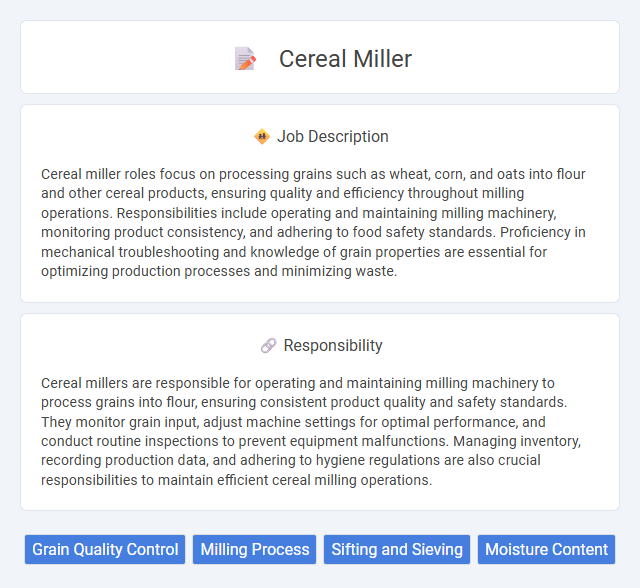
Cereal miller roles focus on processing grains such as wheat, corn, and oats into flour and other cereal products, ensuring quality and efficiency throughout milling operations. Responsibilities include operating and maintaining milling machinery, monitoring product consistency, and adhering to food safety standards. Proficiency in mechanical troubleshooting and knowledge of grain properties are essential for optimizing production processes and minimizing waste.
People with strong physical endurance and attention to detail are likely suitable for a cereal miller job, as it often requires operating heavy machinery and monitoring production processes. Those with respiratory sensitivities or issues related to prolonged exposure to dust may find the working conditions challenging. Overall, individuals who can maintain focus in a fast-paced, industrial environment probably have a higher chance of success in this role.
Qualification
Cereal Miller positions require candidates to have a strong background in food processing, typically demonstrated through a diploma or degree in food science, agriculture, or engineering. Practical experience with milling machinery, quality control protocols, and safety standards is essential for ensuring efficient grain processing and product consistency. Proficiency in monitoring production processes, troubleshooting equipment issues, and maintaining strict hygiene standards further qualifies individuals for this role.
Responsibility
Cereal millers are responsible for operating and maintaining milling machinery to process grains into flour, ensuring consistent product quality and safety standards. They monitor grain input, adjust machine settings for optimal performance, and conduct routine inspections to prevent equipment malfunctions. Managing inventory, recording production data, and adhering to hygiene regulations are also crucial responsibilities to maintain efficient cereal milling operations.
Benefit
Working as a cereal miller may offer competitive wages and opportunities for skill development through hands-on experience with advanced milling equipment. There is a probability of receiving benefits such as health insurance, paid time off, and retirement plans depending on the employer. Job stability and potential career advancement could also be probable advantages in this industry.
Challenge
Cereal miller jobs likely involve managing complex machinery that requires precise calibration to maintain product consistency, presenting a significant technical challenge. There is a probability of encountering production delays or equipment malfunctions that demand quick troubleshooting skills and adaptability. Safety protocols and maintaining high hygiene standards might also pose ongoing challenges in this role.
Career Advancement
Cereal Millers play a critical role in the agriculture and food production industry by operating machinery that processes grains into flour, meal, and other products. Career advancement in this field often involves gaining expertise in equipment maintenance, quality control, and production management, which can lead to supervisory or plant manager positions. Pursuing certifications in food safety and industrial technology further enhances opportunities for leadership roles and higher salaries within milling companies.
Key Terms
Grain Quality Control
Cereal millers specializing in grain quality control ensure the integrity and safety of raw grains by conducting rigorous testing for moisture, contaminants, and nutritional content. They implement standardized procedures to monitor grain quality throughout the milling process, using advanced equipment such as moisture analyzers and particle size analyzers. Maintaining strict quality control guarantees consistent product performance, minimizes waste, and complies with industry regulations and food safety standards.
Milling Process
A cereal miller specializes in the milling process that transforms raw grains such as wheat, corn, or rye into flour and other by-products. The milling process involves cleaning, grinding, sifting, and separating grain components to achieve precise particle size and quality standards. Proficiency in operating and maintaining milling machinery ensures optimal flour yield and consistent product specifications for baking and food production industries.
Sifting and Sieving
Cereal millers play a critical role in processing grains by expertly sifting and sieving to remove husks, bran, and impurities, ensuring fine flour quality. Precision in operating industrial sifters and sieves impacts particle size distribution and enhances product purity in large-scale cereal production. Mastery of these techniques improves milling efficiency, reduces waste, and maintains compliance with food safety standards.
Moisture Content
Cereal millers closely monitor moisture content to ensure optimal grain processing and product quality. Maintaining precise moisture levels between 12-14% prevents mold growth and preserves shelf life during storage. Accurate moisture measurement is critical for milling efficiency, affecting grain weight, texture, and overall flour yield.
 kuljobs.com
kuljobs.com